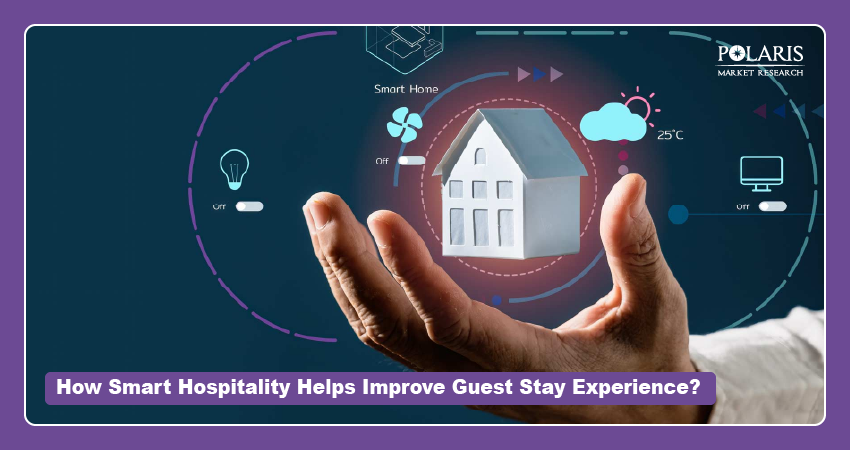How Smart Hospitality Helps Improve Guest Stay Experience?

The word “hospitality” evokes a warm and inviting feeling. It makes us think of individuals who are welcoming and pleasant to be around. The hospitality industry employs millions of people who strive to ensure that their guests have the best possible experience. The sector consistently seeks to adopt new methods and technologies to enhance the guest experience and make it more pleasing and friendly.
Smart hospitality is gaining popularity in the hospitality sector. This blog post covers the essentials of smart hospitality. It covers the key technologies involved and their associated benefits. Major metrics for the smart hospitality market have also been detailed. Continue reading!
What Is Smart Hospitality?
Smart hospitality brings hotels and technology together. It aims to provide a more personalized and connected stay for guests. It involves the use of various tools to give guests more control. These tools include mobile apps, voice assistants, and smart sensors. They offer several capabilities. For example, users can adjust lighting or room temperature with just a simple tap or voice command.
What Are Technologies Used in Smart Hospitality?
Smart hospitality means there’s advanced technology in place in the hotel for improving guest comfort and providing more personalized experiences.
IoT Devices
The IoT technology market uses the internet to connect everyday devices. The internet connection means the devices can communicate in real-time. The use of these devices transforms ordinary rooms into responsive spaces that can adapt to the occupancy and preferences of guests.
Commonly used IoT devices include smart thermostats and automated lighting systems. Smart thermostats can learn the temperature preferences of guests and make adjustments accordingly. Guests can use voice or an app for controlling automated lighting systems. Other IoT devices include smart blinds, connected minibars, and smart TVs.
Mobile Apps
Mobile technology is changing the check-in experience at hotels. It has taken away the need for waiting at the front desk. Dedicated hotel apps make it easy for guests to check in and check out. They can skip the lines and go straight into their room. Smartphones can also be used as digital room keys after checking in.
The inclusion of features such as in-app room service requests makes it possible for guests to order food or other things without having to make a call. The built-in chat support facilitates instant connection between the guests and the front desk if they have any questions or need help.
Voice-Activated Assistants
Voice-activated assistants are a part of smart hotels. They provide guests with a hands-free and personalized experience. Devices like Google Assistant and Alexa allow guests to control their rooms using voice commands.
Modern guests value speed and convenience. So, voice assistants are highly appealing to them. Many travelers prefer the use of multilingual voice assistants, powered by the voice assistant application market. This is because they eliminate language barriers. They also make it easy to get information or request services.
How Big is the Smart Hospitality Market?
Our latest analysis reveals that the smart hospitality market is expected to account for significant growth. The market was valued at USD 22.88 billion in 2024. It is projected to account for a CAGR of 29.79% during the projection period.
Rising investments in the development of hotels and increased demand for upscale accommodations are the key factors driving market growth. The growing tourism industry is also having a favorable impact on the expansion of the smart hospitality market.
What Are the Benefits of Smart Hospitality?
Improved Convenience: Smart hospitality improves convenience for guests. It provides them with greater control over their room environments. There’s no need to make manual adjustments to settings. Many smart hotels save the preferences of their guests from previous visits. So, guests can expect that everything is set according to their preferences.
Faster Service Experiences: The presence of features such as mobile check-in and digital room keys allows guests to skip the front desk. They can access features without delay. This helps in streamlining the complete experience.
Enhanced Satisfaction: Smart hotels have custom welcome messages for their guests. They also provide suggestions based on guest preferences. This makes guests feel valued and seen. It also ensures that the stay is enjoyable and memorable.
Increased Hotel Efficiency: Smart hospitality involves automation tools such as smart room control and service robots. This takes away the need for manual repetitive tasks. It also frees up the staff so that they can focus on high-value interactions that help improve the customer experience.
Better Energy Management: Smart systems are capable of making automatic adjustments to heating and lighting based on the number of occupants in the room. This supports improved energy management and makes operations more eco-friendly.
Competitive Differentiation: The use of smart technology helps hotels stand out among their traditional competitors. The presence of high-tech experiences attracts modern travelers who value convenience and want to have a memorable stay.
How AI Is Changing the Smart Hospitality Market?
Artificial intelligence (AI) can analyze large volumes of data. This data can be used to recommend services and create customized stays. The automation of daily tasks with AI helps in reducing labor costs and improving resources. AI algorithms can adjust room rates based on demand and market trends. This can help in maximizing occupancy and revenue. The capability of AI to predict potential equipment failure means hotels can avoid guest disruptions and costly damage.
Conclusion
The hospitality sector is always seeking ways to enhance the guest experience. The use of smart systems helps hotels makes for a highly comfortable stay. Smart hospitality also enables hotels to automate repetitive tasks and streamline operations. The key players in the smart hospitality market are expected to continue offering more innovative solutions that meet the diverse needs of hotels.

